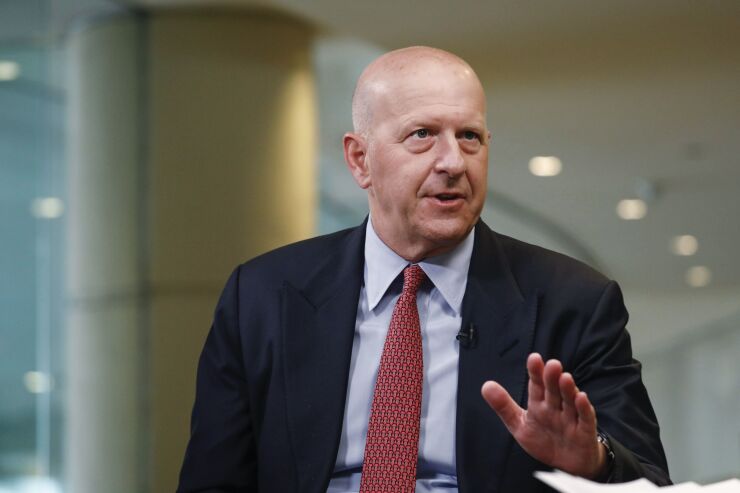Goldman Sachs will soon stop making new personal loans under its Marcus brand as it continues scaling back its once-grand ambitions in consumer finance, executives said.
The New York bank is also shelving plans to roll out a checking account for its wealth management customers — an initiative whose scope had
The two announcements, which CEO David Solomon made on the bank's quarterly earnings call Tuesday, add more detail to the investment bank's retreat from what it once viewed as promising initiatives.
"We tried to do too much too quickly," Solomon said when an analyst asked him to reflect on what went wrong.
Goldman, long known as a Wall Street powerhouse, is not abandoning its consumer aims entirely. It's continuing to draw in consumer deposits through its Marcus savings accounts and certificates of deposit, and it will lean into its credit card partnerships with Apple and General Motors. Also, its GreenSky point-of-sale lending platform, which Goldman
Those three areas are "good businesses that can be accretive to the firm," Solomon said, giving the bank a "more cogent path forward" in its consumer strategy. The pullbacks elsewhere reflect the "ethos of the nimbleness of Goldman Sachs" and its willingness to pivot when needed, Solomon said.
"We're not married to things. We're willing to change," Solomon said.

The company's stock closed down more than 6% on Tuesday. Deutsche Bank analyst Matt O'Connor attributed the decline partly due to a lack of clarity on the consumer strategy, though he noted executives will provide more details at Goldman Sachs' investor day next month.
Investors also likely reacted to higher-than-expected costs at Goldman, O'Connor wrote in a note to clients. The company's compensation and benefits expenses rose slightly during the quarter, which Solomon said reflects the investments the bank has had to make in a "talent-driven business."
Last quarter's higher expenses do not include severance costs tied to its move last week to
As part of the reorganization, Goldman created a new Platform Solutions division that includes the company's credit card partnerships with Apple and GM, along with its GreenSky loans.
Though net revenues have jumped since 2020, the cost of running those operations and set-asides for loan losses have meant that the bank has lost roughly $3.8 billion in pretax earnings over the past three years.
The bank is "very focused on developing a path toward profitability" for that division, which is growing at a rapid pace, Solomon said. Net revenues for the division were $1.5 billion last year, up by 135% compared with 2021.
The pullback in personal loans — ranging from $3,500 to $40,000 — will not be immediate, and the Marcus website still shows it's taking applications.
But the bank "started a process to cease offering new loans" through the Marcus platform, Solomon said. Its existing loan book will likely "roll down naturally" as loans get paid off, but the company is also considering other alternatives to shed its portfolio, Solomon said.
A Goldman Sachs spokesperson declined to elaborate on when Marcus will fully cease offering personal loans or what those other alternatives entail.
At least part of the difficulty in the loan business was attributed to the Current Expected Credit Losses standard, an accounting standard that took effect in 2020 and aimed to make sure banks' loan books are better prepared for handling a tougher economy. CECL requires banks to set aside reserves for loans as soon as they make them, rather than when they start believing borrowers may be unable to repay them.
"CECL changed the curve on growing these lending businesses at scale from scratch," Solomon said. "So we've had to adjust to that."
The bank also invested in developing a checking account platform and
Solomon said the latter initiative has been postponed, with plans to revive it "at the right time in the future."






